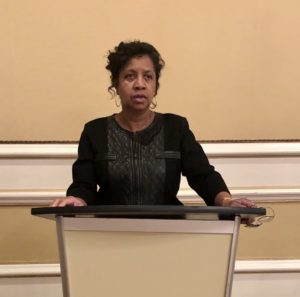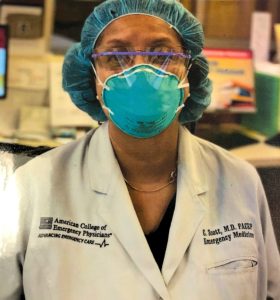Caring for Patients; Caring for Community
 Meeting Patients Where They Are
Meeting Patients Where They Are
Carol Scott, MD, MSEd, FACEP is a gifted doctor for whom healing goes much deeper than treating and releasing emergency department patients. She’s also passionate about educating her community – and preventing patients from needing her services in the first place.
“My background is in medicine, but I also consider myself an educator, bedside patient advocate and coach.” said Dr. Scott. “I really enjoy listening to understand individual patient’s illness and experiences. This helps me understand how to share their diagnosis and treatment options right at the bedside, in that moment. So, this new project comes very naturally to me.”
This “new project,” recently featured in Washington Post and Baltimore Sun, isn’t from new work. It’s actually from the culmination of a decade of wellness coaching and a lifetime of dedication to social justice. Ten years ago, Dr. Scott became a certified wellness coach from Wellcoaches, a premiere global company which has a scientific, evidence-based approach to helping people. It begins with meeting people right where they are.
Wellcoaches
“When the pandemic hit in March, I received a phone call from Margaret Moore, who is the CEO and founder of Wellcoaches,” said Dr. Scott. “She was offering pro bono peer wellness coaching skills and training to support communities of color who had been disproportionally impacted by COVID, especially due to pre-existing conditions of heart disease, diabetes, and general lack of access to care,” Dr. Scott explained. “I got to work right away.”
Dr. Scott teamed with her pastor, Rev. Grey Maggiano of the Memorial Episcopal Church in Bolton Hill, and fellow healthcare congregants Shannon McCullough and Karen Mercer to form Kindred Coaches. The idea was to train people to be peer coaches who would encourage community members to manage their health and aid them in navigating the healthcare system.
Though the program is run out of Memorial Episcopal, the peer coaches and those they counsel do not have to be Episcopalian or any religion. However, historically, churches have been a vital gathering place in the community, particularly for people of color. And particularly her church, which is especially prides itself on being justice-focused because of their faith.
Getting Started
Beginning with their first cohort of 25 peer coaches, Dr. Scott brought in subject matter experts in hypertension, nutrition, diabetes and depression/stress to educate the counselors. She designed a set of communication tools that particularly targets people with high morbidity, diabetes, hypertension, and more.
“The coaches begin with a conversation – they discuss with the participant what is important to them, and then they brainstorm together on how to work toward the change the participant desires,” said Dr. Scott.
Recognizing and working through unconscious bias
Another element of the program is educating physicians – particularly frontline emergency physicians– in the issue of implicit or unconscious bias toward any difference of age, gender, sexual orientation, and/or race.
“Implicit and unconscious bias is inevitable in each of us, including physicians,” Dr. Scott said. “And the evidence tells us it contributes to health care disparities and can influence patient experiences – and patient satisfaction scores.”
Scott pointed to research conducted by Lisa A. Cooper MD, who found that physicians who scored high in implicit bias were more likely to dominate conversations with black patients than were those who scored lower in implicit bias, and that black patients trusted them less, had less confidence in them, and rated their quality of care as poorer.[1] Researchers have examined ways that providers may inadvertently demonstrate such bias, including through language. In a study in Social Science & Medicine, Nao Hagiwara, PhD, at Virginia Commonwealth University, and colleagues learned that individual words physicians use can also signal implicit bias. She looked at physicians’ tendency to use first-person plural pronouns such as “we,” “ours” or “us” when interacting with black patients.
 The Way Forward
The Way Forward
But, Dr. Scott noted, biases can be changed.
“The way forward is to reach out to those who are particularly vulnerable and at risk, and to help them to speak up in situations where they or others have been disrespected or felt marginalized,” she said. “I created a strategy called ‘Courageous Conversations for Health Equity’ that asks participants what they are willing to commit to achieve better health, beginning with themselves.” This is the model we are using for Kindred Coaches.
The peer wellness coaching provides participants with empowerment and gives them a script for conversations with their providers. It guides them through sharing their medical history, including their most urgent issues. It also teaches them how to politely interrupt the provider when they feel they are not being listened to – to identify what isn’t true and how to clarify and explain the reasons behind the behaviors.
“I call this component ‘provider-centered conversation’ to complement ‘patient-centered conversations’ which have been proven to be associated with enhanced compliance and adherence to a medical regimen,” Dr. Scott said.
She added that one element she feels particularly good about is teaching the concept of reflecting, or mirroring.
[1] Cooper, Lisa A., et al. “The associations of clinicians’ implicit attitudes about race with medical visit communication and patient ratings of interpersonal care.” American journal of public health 102.5 (2012): 979-987.


 Meeting Patients Where They Are
Meeting Patients Where They Are The Way Forward
The Way Forward